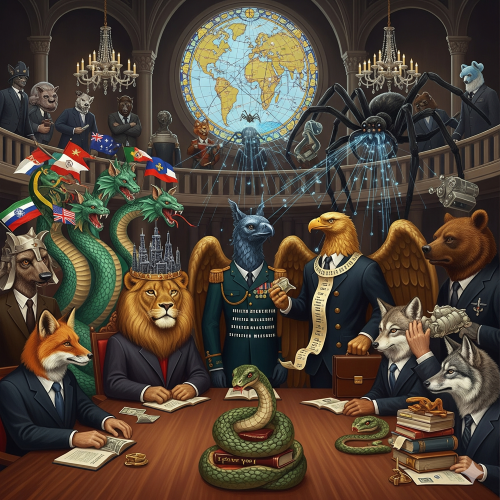Could growing U.S. nationalism reduce Europe’s ability to shape American politics and policies in the future?

Certainly, growing U.S. nationalism will significantly reduce Europe's ability to shape American politics and policies in the future, fundamentally altering the transatlantic relationship from a partnership of shared values to a more transactional, zero-sum engagement.
This reduction in influence stems from the core tenets of modern American nationalism, which prioritize "America First" unilateralism, view multilateral agreements with skepticism, and redefine foreign alliances based on immediate economic or security contributions rather than historical solidarity.
1. Erosion of Shared Values and Policy Access
The traditional bedrock of European influence in Washington was the notion of a "community of values" and the institutionalized habits of cooperation built over the post-WWII era. Nationalism dismantles this foundation.
A. The Decline of Ideological Alignment
Historically, the EU could influence the U.S. by framing its policies (e.g., on climate, multilateralism, human rights) within a shared Western liberal order.
-
Nationalist Rejection: American nationalism views this "liberal internationalism" as a constraint on U.S. sovereignty. Policies that do not directly benefit the American worker or enhance national power are dismissed as globalist distractions.
-
Policy Divergence: This creates a deep rift on core issues:
-
Climate: The EU's proactive Green Deal clashes with an American nationalist focus on energy independence and the rejection of global climate commitments.
-
Democracy Promotion: Nationalist foreign policy is less concerned with internal European democratic health and more with burden-sharing and transactional security.
-
B. Decreased Access for Lobbying and Soft Power
Europe’s influence often relied on soft power—the prestige and institutional access afforded to its diplomats, think tanks, and trade bodies in Washington D.C.
-
Dismissal of Expertise: Nationalist administrations tend to be less reliant on traditional foreign policy experts, many of whom are seen as "globalists." This devalues the technical and intellectual expertise offered by European counterparts and lobbyists.
-
The "America First" Filter: Every European policy initiative—from the Digital Markets Act (DMA) to environmental standards—is now filtered through a lens of whether it hurts American companies or compromises U.S. technological leadership, making European regulatory harmonization efforts a source of antagonism rather than cooperation.
2. The Weaponization of Trade and Economic Policy
The most potent tool of rising U.S. nationalism is economic protectionism, which flips the power dynamic of the transatlantic economic relationship and forces Europe onto the defensive.
A. Protectionism Over Partnership
American policy increasingly favors domestic production and job creation over global free trade, leading to policies that directly undermine EU economic interests.
-
Tariff Threats: The threat of imposing broad, high tariffs (e.g., blanket tariffs on all EU imports, steel/aluminum tariffs) is the ultimate bargaining chip. This forces the EU to spend its political capital mitigating economic damage instead of advancing its own regulatory agenda.
-
Discriminatory Subsidies: Acts like the Inflation Reduction Act (IRA), while ostensibly green policy, contain "Buy American" provisions and domestic content requirements. These policies are highly nationalistic, requiring the EU to constantly lobby for exemptions to protect its own industries (like electric vehicle manufacturing), rather than using its influence to shape U.S. policy in areas like competition or privacy.
B. The Transactional Security-for-Trade Link
Nationalist administrations often link U.S. security guarantees (e.g., commitment to NATO) to economic disputes.
-
Quid Pro Quo: Europe's massive trade surplus with the U.S. and its chronic under-spending on defense are framed as the EU taking advantage of the U.S. The implied message is that continued U.S. security commitment is contingent upon Europe making economically favorable concessions to the U.S.
-
EU Vulnerability: This linkage means that Europe's security is now a variable in a transactional negotiation, severely limiting its leverage to push its values-based political agenda in Washington.
3. The European Response: Towards Strategic Autonomy
The decline in American reliability and the rise of U.S. nationalism are compelling the EU to reduce its dependence on the U.S., a process known as "Strategic Autonomy." While this will increase Europe's independence, it marks a formal acceptance of its diminished influence in Washington.
A. Deepening European Integration
Faced with an unpredictable America, Europe's only path to geopolitical relevance is to strengthen itself.
-
Defense Spending: There is an acceleration of efforts to develop a credible European defense pillar and increase defense spending, in part to appease U.S. demands but also to insure against potential U.S. withdrawal from NATO commitments.
-
Industrial Policy: The EU is developing its own industrial policies and regulatory standards (like the AI Act and digital taxation) with less regard for U.S. concerns, aiming to make its own rules the global de facto standard through the "Brussels Effect," rather than compromising to align with U.S. policy.
B. The End of the "Special Relationship"
The ultimate consequence is that the EU must now view the U.S. not as an intrinsic ally, but as a great power with overlapping, but distinct, national interests.
-
Diminished Political Clout: The EU's unique status—a trusted partner whose counsel was considered valuable—is being replaced by the status of a major trading bloc and security contributor whose influence must be earned on a per-issue, transactional basis. Its ability to shape the internal politics of the U.S. (e.g., influencing Congressional votes or policy appointments) will become nearly non-existent, leaving it primarily to react to, rather than prevent, U.S. nationalist policies. This fundamentally weakens the political relationship, making it a functional alliance of convenience rather than a unified democratic front.
- Questions and Answers
- Opinion
- Motivational and Inspiring Story
- Technology
- Live and Let live
- Focus
- Geopolitics
- Military-Arms/Equipment
- Security
- Economy
- Beasts of Nations
- Machine Tools-The “Mother Industry”
- Art
- Causes
- Crafts
- Dance
- Drinks
- Film/Movie
- Fitness
- Food
- Games
- Gardening
- Health
- Home
- Literature
- Music
- Networking
- Other
- Party
- Religion
- Shopping
- Sports
- Theater
- Health and Wellness
- News
- Culture

